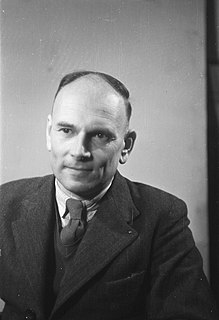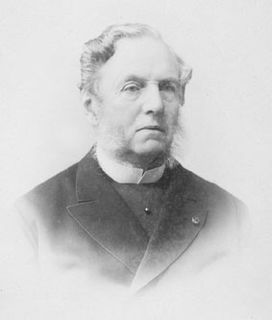
The States General of the Netherlands is the bicameral legislature of the Netherlands consisting of the Senate and the House of Representatives. Both chambers meet at the Binnenhof in The Hague.

Jonkheer Marinus van der Goes van Naters was a Dutch politician of the defunct Social Democratic Workers' Party (SDAP) and later the Labour Party (PvdA) and lawyer.

General elections were held in the Netherlands on 6 March 1888. The Liberal Union emerged as the largest party, winning 46 of the 100 seats in the House of Representatives.

General elections were held in the Netherlands on 9 June 1891. The Liberal Democratic League emerged as the largest party, winning 53 of the 100 seats in the House of Representatives.

General elections were held in the Netherlands on 10 April 1894. The Liberal Democratic League remained the largest party, winning 57 of the 100 seats in the House of Representatives.
General elections were held in the Netherlands on 17 and 25 June 1913. Despite receiving the fourth highest number of votes, the General League of Roman Catholic Caucuses emerged as the largest party, each winning 25 of the 100 seats in the House of Representatives. After the election, the independent liberal Pieter Cort van der Linden became Prime Minister of the Netherlands, leading a cabinet of Liberals, Free-thinking Democrats, Christian Historicals and other independent liberals.

Jan Jacob Rochussen was a Dutch politician. He served as Finance Minister from 1840 to 1843 and Governor-General of the Dutch East Indies from 1845 to 1851. He served as Chairman of the Council of Ministers from 18 March 1858 to 23 February 1860.

Roger Henri Ludovic Maria van Boxtel is a Dutch politician of the Democrats 66 (D66) party.

Jacob Pieter Pompejus, Baron van Zuylen van Nijevelt was a Dutch politician who served as Minister of Foreign Affairs of the Netherlands from 1852 to 1853, and again in 1861. During his second term as minister, he was also the chairman of the Council of Ministers, an office now known as Prime Minister.

Julius Philip Jacob Adriaan, Count van Zuylen van Nijevelt was a conservative Dutch politician.

General elections were held in the Netherlands on 30 November and 4 December 1848. Held immediately after the Constitutional Reform of 1848, they were the first direct elections to the House of Representatives, and were the first to elect a States General to which government ministers would be responsible. Voting was restricted to men over the age of 23, and who paid a certain level of taxation. This limited the franchise to 55,728 people, roughly 11% of the male population over 23, or 2.5% of the total population of the country. Candidates were elected in districts in a two-round system; if no candidate received over 50% of the vote in the first round, the top two candidates would face a run-off. The districts had one MP for every 45,000 inhabitants.

General elections were held in the Netherlands on 27 July 1850.

General elections were held in the Netherlands on 22 January 1868.

Partial general elections were held in the Netherlands on 13 June 1871 to elect half the seats in the House of Representatives.

Partial general elections were held in the Netherlands on 12 June 1877 to elect half the seats in the House of Representatives.

General elections were held in the Netherlands on 12 June 1883.

General elections were held in the Netherlands on 17 May 1853. They followed the dissolution of the House of Representatives as a result of a government crisis caused by the restoration of the episcopal hierarchy.

General elections were held in the Netherlands on 1 September 1887.

The Vice-President of the Council of State is the de facto presiding officer of the Council of State. The Monarch serves as ex officio President of the Council of State but in reality seldom chairs meetings, in his absence the Vice-President serves as pro tempore chair of those meetings. The Vice-President is also in charge of the Council's organisation and administrative duties. The Constitution of the Netherlands stipulates that if the royal house were to become extinct the Vice-President will become the acting Head of state. Like the other Members of the Council of State the Vice President is appointed by the Monarch upon nomination by the Minister of the Interior and Kingdom Relations. The service of the Vice-President is a life tenure appointment but is required by law to enter a mandatory retirement at the age of 70. Alternatively, an early retirement or a forced termination of his tenure can be given by the Monarch in a Royal Decree.









